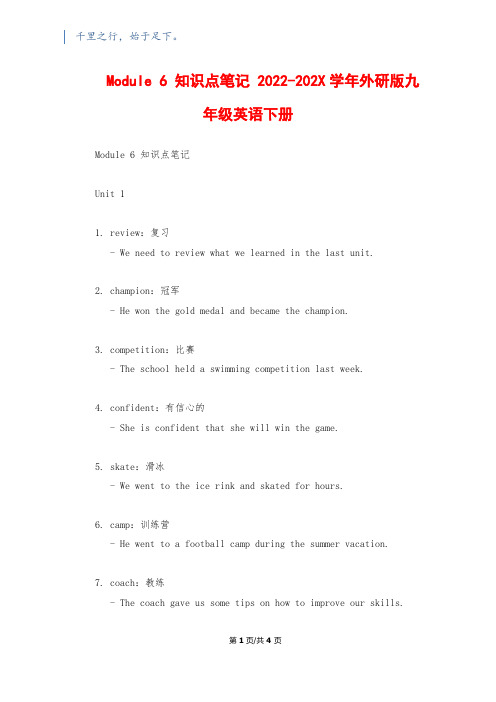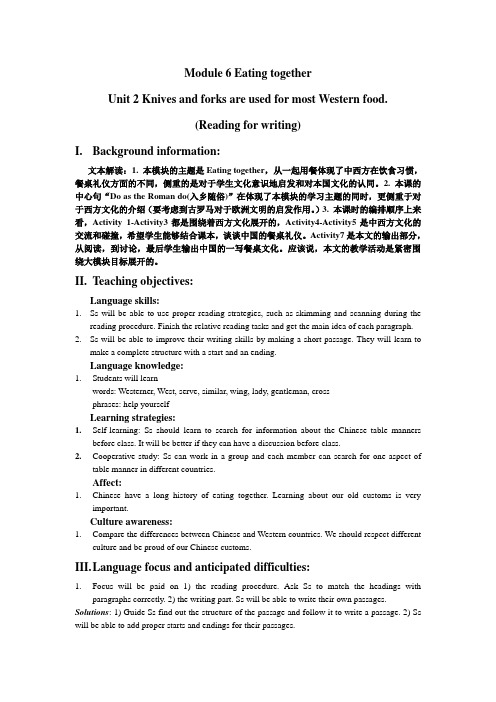外研版九年级英语下册Module 6 模块知识点归纳
外研版初三下册英语module6知识点梳理:unit1

外研版初三下册英语module6知识点梳理:unit1I. 根据中文完成句子。
1. 运动会将在5月18日举行。
The sports meeting _________ __________________on May 18.2. 酸辣汤是玲玲在家里做的。
Suanlatang _________ _________by Lingling at home.3. 饺子是中国的传统食物。
Jiaozi is a _________ _________ from China.4. 世界上到处都有人吃比萨饼。
Pizza can _________ _________ everywhere all over the world.5. 要求每个人带些吃的东西。
Everyone will _________ _________ _________ bring something _________ _________.II. 把下列句子变成被动词态。
1. Do they teach Japanese in their school?___________________________________________________ ___2. We heard her sing in the room.___________________________________________________ ___3. Will they eat a special dinner at the restaurant?___________________________________________________ ___4. He hasn’t finished his homework yet.___________________________________________________ ___5. He gave me a very nice present for my birthday.___________________________________________________ ___6. Can we make jiaozi at school?______________________________________________________7. Must we finish the work now?___________________________________________________ ___8. Linda looks after the kid at home.___________________________________________________ ___9. He found nobody in.___________________________________________________ ___l0. They saw a lot of students playing basketball on the playground.___________________________________________________ ___有了上文梳理的初三下册英语module6知识点梳理,相信大家对考试充满了信心,同时预祝大家考试取得好成绩。
新外研版九下Module6 XXX知识点总结

新外研版九下Module6 XXX知识点总结M6 XXXUnit 11.XXX。
It is also possible to XXX to do something or to XXX.2.When will the school-leaver's party take place?3.The school-leaver's party will be held on May 30th。
(Please review the eight passive voice forms.)4.In fact。
I was selected to play the dance music。
Choose isa XXX." Its past tense is chose and its past participle is chosen。
Choose to do something means "to select to do something." The noun form of choose is choice。
which means "to make a n." It is usually used with the verb make。
We each had to make a choice。
nally。
choose can also be an adjective meaning "selected."5.XXX "to make ready." It is followed by a noun or pronounas its object。
Common phrases include "prepare someone something" or "prepare something for someone," meaning "tomake something for someone." Another common phrase is "prepare to do something," meaning "to get ready to do something." For example。
Module 6 知识点笔记 2022-202X学年外研版九年级英语下册

Module 6 知识点笔记 2022-202X学年外研版九年级英语下册Module 6 知识点笔记Unit 11. review:复习- We need to review what we learned in the last unit.2. champion:冠军- He won the gold medal and became the champion.3. competition:比赛- The school held a swimming competition last week.4. confident:有信心的- She is confident that she will win the game.5. skate:滑冰- We went to the ice rink and skated for hours.6. camp:训练营- He went to a football camp during the summer vacation.7. coach:教练- The coach gave us some tips on how to improve our skills.第1页/共4页8. teammate:队友- She enjoys playing basketball with her teammates.9. opportunity:机会- This competition is a great opportunity for us to show our talent.10. injury:受伤- He couldn't participate in the race because of his injury.Unit 21. performance:表演- The actors gave a brilliant performance on stage.2. audience:观众- The audience applauded loudly after the performance.3. stage:舞台- The actors walked onto the stage one by one.4. costume:戏服- The actors changed into their costumes backstage.5. script:剧本- The director handed out the scripts to the actors.6. rehearse:排练- The cast members need to rehearse every day for the play.7. dialogue:对话- The actors practiced their dialogues together.8. scene:场景- They were filming a scene in the park yesterday.9. lighting:灯光- The lighting in the theater was very beautiful.10. applause:鼓掌- The audience gave a round of applause at the end of the play.Unit 31. daily routine:日常生活- She has a fixed daily routine that she follows every day.2. tidy up:整理- I need to tidy up my room before my friends come over.3. grab:抓住- He grabbed his bag and ran out of the house.4. dishwashing:洗碗- I take turns with my sister in doing the dishwashing.5. lawn mowing:修剪草坪- My brother helps with the lawn mowing every weekend.第3页/共4页6. take out the rubbish:倒垃圾- It's my turn to take out the rubbish today.7. do the laundry:洗衣服- She does the laundry every Sunday.8. grocery shopping:买菜- My mom goes grocery shopping every week.9. iron clothes:熨衣服- My dad usually irons his clothes before going to work.10. mop the floor:拖地- I mop the floor every evening to keep it clean.。
外研版九年级下册M6知识点

外研版九年级下册M6知识点外研版九年级下册M6是我们中学生学习英语的一本重要教材,它涵盖了多个重要的知识点,帮助我们更好地学习和掌握英语。
在这篇文章中,我将从几个方面来探讨M6的知识点。
首先,M6的语法知识点是学习英语的基础。
在这个单元里,我们学习了被动语态的用法。
被动语态在英语中是非常重要的,它能够帮助我们更好地理解和表达被动的动作。
通过学习被动语态,我们能够更加灵活地运用英语,提高我们的口语表达能力。
同时,M6还教我们了一些常用的句型和短语,例如"be supposed to"和"prefer to"等。
这些句型和短语的学习能够帮助我们丰富我们的表达方式,提高我们的语言表达能力。
其次,M6还介绍了几个重要的话题,如环保和旅游。
我们学习了一些与环境保护有关的词汇和短语,例如"pollution"和"recycle"等。
这些词汇不仅可以帮助我们更好地理解文章的内容,还可以扩展我们的词汇量,提高我们的阅读能力。
旅游是另一个重要的话题,在M6中我们学习了一些旅游相关的词汇和句型,例如"tourist attractions"和"plan a trip"等。
通过学习这些词汇和句型,我们能够更好地进行旅行规划和沟通,增加我们的实际应用能力。
除了语法和话题,M6还涉及了一些重要的阅读技巧。
在这个单元中,我们学习了如何阅读和理解图表和图表。
这对我们提高阅读理解能力非常有益。
图表和图表是现实生活中经常出现的形式,例如数据报告和统计数据。
通过学习阅读这些图表和图表,我们能够更好地获取信息和分析数据,提高我们的综合运用能力。
此外,M6也涉及了一些写作技巧。
我们学习了如何写一封邀请信和一篇旅行日记。
这些写作技巧对我们来说非常重要,因为它们可以帮助我们更好地表达我们的想法和情感。
通过学习这些写作技巧,我们能够培养我们的写作能力,提高我们的文学素养。
Module 6 重要知识点讲解2021-2022学年外研版九年级英语下册

Module 6 Eating together重要知识点讲解Unit 1一、重点表达in fact 实际上;事实上be chosen to do 被选做某事heat up 使变热;给……加热be made with 用……制作be made of 由……制成(看出原料)be made from 由……制成(看不出原料)invite sb. to邀请某人做be popular with/in 在……中受欢迎no good 不合适And you? 你呢?be invited to 被邀请做finger food 手抓饭dance music 舞曲school calendar 校历二、dishThe teachers have asked everyone to prepare a traditional dish from their home country.老师要求每人准备一道家乡的传统菜。
[点拨]dish 可以表示“烹制好的菜肴,一道菜”。
When I was in Italy, I had a wonderful pasta dish. 我在意大利的时候,吃过一次很棒的意大利面。
dishes 复数可表示“待洗的餐具”。
I’ll do the dishes before we go.我们走之前,我会把餐具洗好的。
三、no goodOh, soup's no good then.哦,汤不行。
[点拨](1) it is no good doing 做某事没用It's no good talking to him—he never listens. 跟他讲没用,他从来不听。
(2) no good for sth. 不适合某物/某事This medicine is no good for headache. 这药治不了头痛。
(3) no good to sb. 对某人没有好处或帮助A car is no good for me, since I can't drive.汽车对我没用,因为我不会开车。
Module 6 知识点笔记-外研版九年级英语下册

外研版英语九下M6知识点笔记U11.invite: v.邀请invitation: cn.邀请invite sb. to sp.: 邀请某人去某地I’m writing to invite you to my new house. 我写信是邀请你去我的新房子。
invite sb. to do sth.: 邀请某人做某事Yesterday my friend invited me to play table tennis. 昨天我的朋友邀请我去打乒乓球。
2.choose: v. 选择(chose,chosen)choice: n. 选择choose sth.:选择某物I’m choosing a gft for my mother. 我正在为我妈妈选礼物。
choose(sb.)to do sth: 选择(某人)做某事We choose him to be our monitor. 我们选他当我们的班长。
make a choice:作出选择We each have to make a choice.v我们每个人都得作出选择。
3.prepare: vt. 准备prepare sth. for sb.: 为某人准备某物She prepared a nice breakfast for us.她为我们准备了可口的早餐。
Prepare to do sth.: 准备做某事I am busy preparing to go on a holiday. 我正忙着去准备度假。
prepare: vi. 准备prepare for: 为.....做准备I have to prepare for an exam. 我必须为考试做准备。
4.be made with: 用......做成(with +制成某物所用的材料或工具)The soup is made with eggs and tomatoes. 这个汤是用鸡蛋和西红柿做成的。
外研版初三英语下册Module6 Eating together全章知识点复习总结

Module6 Eating together一、语言知识点1.词汇:finger, basket, bread, fork, knife, lemonade, pancake, serve, spoon, hold, hot, roll, Roman, saying, cheers, plate, explanation, cross, generally, over, blind, sense, taste, owner, bee, officer, course2.词汇:at the start of 在……开始的时候heat up 加热worry about 为……担心instead of 代替as soon as 一……就cut with the knife 用小刀切know about 知道了解eat western food 吃西方的食物no ...any more 不再prepare a traditional dish准备传统的菜3.语法被动语态用法①Will we be allowed to cook it at school.②He said he would be invited to speak at the meeting.③I have been chosen to look after the dance music.④When we got there, we found the house had been burnt to ashes.二、课文知识点讲解1.And everyone has been told to prepare a traditional dish from our own countries.并且通知每人要准备一道自己国家的传统食物。
在这句话中,dish的意思是“烹制好的菜肴;一道菜;食品”。
例如:When I was in Italy, I had a wonderful pasta dish.我在意大利的时候,吃过一顿很棒的意大利面食。
外研版英语九年级下册:Module 6 Unit 2 Knives and forks are us

Module 6 Eating togetherUnit 2 Knives and forks are used for most Western food.(Reading for writing)I.Background information:文本解读:1. 本模块的主题是Eating together,从一起用餐体现了中西方在饮食习惯,餐桌礼仪方面的不同,侧重的是对于学生文化意识地启发和对本国文化的认同。
2. 本课的中心句“Do as the Roman do(入乡随俗)”在体现了本模块的学习主题的同时,更侧重于对于西方文化的介绍(要考虑到古罗马对于欧洲文明的启发作用。
)3. 本课时的编排顺序上来看,Activity 1-Activity3都是围绕着西方文化展开的,Activity4-Activity5是中西方文化的交流和碰撞,希望学生能够结合课本,谈谈中国的餐桌礼仪。
Activity7是本文的输出部分,从阅读,到讨论,最后学生输出中国的一写餐桌文化。
应该说,本文的教学活动是紧密围绕大模块目标展开的。
II.Teaching objectives:Language skills:1.Ss will be able to use proper reading strategies, such as skimming and scanning during thereading procedure. Finish the relative reading tasks and get the main idea of each paragraph. 2.Ss will be able to improve their writing skills by making a short passage. They will learn tomake a complete structure with a start and an ending.Language knowledge:1.Students will learnwords: Westerner, West, serve, similar, wing, lady, gentleman, crossphrases: help yourselfLearning strategies:1.Self-learning: Ss should learn to search for information about the Chinese table mannersbefore class. It will be better if they can have a discussion before class.2.Cooperative study: Ss can work in a group and each member can search for one aspect oftable manner in different countries.Affect:1.Chinese have a long history of eating together. Learning about our old customs is veryimportant.Culture awareness:pare the differences between Chinese and Western countries. We should respect differentculture and be proud of our Chinese customs.III.L anguage focus and anticipated difficulties:1.Focus will be paid on 1) the reading procedure. Ask Ss to match the headings withparagraphs correctly. 2) the writing part. Ss will be able to write their own passages. Solutions: 1) Guide Ss find out the structure of the passage and follow it to write a passage. 2) Ss will be able to add proper starts and endings for their passages.2.It’s difficult for Ss to understand the main idea of the passage without backgroundinformation..Solution: encourage Ss to search for information before the class and personal experience is also important.IV.Teaching aids:Blackboard, PPT, some pictures, videoV.Teaching procedures:Warming up:1.Enjoy a video: watch the video “ A trip to Rome”.Answer a question: Where is it? It’s in Rome, Italy.Pre-reading:1.Free talk: Have you ever heard this saying “ When in Rome, do as the Romans do.”? Talkabout its meaning to your partner.2.Look at the photos and discuss.Q: What do you see at a meal in China?A: They use chopsticks. The food is serve d for a group of people.Q: What do you see at a meal in a Western country? (People live in a Western country are Westerner s.)A: They use a knife and fork. the food is served for a person.Conclusion: They are different.(“different” means “not similar”.)3.Discussion: if you are invited to have dinner in a Western family, what rules should youfollow? (list some rules below)1) Arrive on time. 2) Bring a gift. 3) Put the Handkerchief on your legs. 4) Fork is put in yourleft hand and knife is in your right. 5) Cut the steak into pieces quietly. 6) Uesd fork and knife should be put on your plate. 7) Thank the host after dinner. 8) Ladies first !(Gentlemen should do after ladies.)While-reading:1.Fast reading:a.Ask and answer.1)Who is the passage written for? (A: The passage is written for visitors to Westerncountries from another part of the world)2)Where might you see a passage like this? (A: The passage might appear in a magazine,such as an travel magazine.)b.Match the headings with the paragraphs.2.Careful reading:1)Read the passage and complete the table in Activity 3. Find the information from thepassage. (Reading strategy: use the heading of each paragraph properly)2)Read the passage carefully and answer the questions. (pay attention to Ss’ personalexperience in the life when they compare the differences between China and the West.) Post-reading:1.Can you list some Chinese eating customs for the foreign visitors? You can write from theseaspects.Time: In China, lunch is usually served around…./Dinner is served….Greeting: At the start of meal, people often say….Tableware(餐具): People use chopsticks to…/spoons to…/ we sometimes use fingers to…Service(服务): You will be served by yourself/ by someoneEnd of meal: If you have finished, your should …./It’s not polite if you ….2.Give your start and ending for your passage.Start: ___________________________________________________________Ending: _________________________________________________________3.Try to make a short passage by themselves.4.Do you know?There is a theory called “Iceberg theory”. It tells people that people’s behaviors are just a small part that we can see. But the behaviors are decided by their nations, environment and so on. Try to understand each other and respect the different cultures in the world! Homework:You must:1.Finish Exercise Book 1 M6U22.Read the words at least 5 times and passage at least 3 times.3.Finish writing the complete passage.You may:1. Search more information about different customs in different countries.VI.Blackboard design:。
- 1、下载文档前请自行甄别文档内容的完整性,平台不提供额外的编辑、内容补充、找答案等附加服务。
- 2、"仅部分预览"的文档,不可在线预览部分如存在完整性等问题,可反馈申请退款(可完整预览的文档不适用该条件!)。
- 3、如文档侵犯您的权益,请联系客服反馈,我们会尽快为您处理(人工客服工作时间:9:00-18:30)。
Module 6 Eating together
When is the school-leavers' party?
必背单词
1.invitation(n.)邀请;请柬→invite(v.)邀请
2.paint(v.)绘画→painting(现在分词)
3.heat(v.)使变热,给……加热→heat(n.)高温,热度
4.knife(n.)餐刀;刀具→knives(pl.)
5.Italian(adj.)意大利的;意大利语的;意大利人的;(n.)意大利语;
意大利人→Italy(n.)意大利
6.calendar(n.)日历;历书
7.balloon(n.)气球
8.fork(n.)餐叉
9.spoon(n.)匙;勺子
10.cheeseburger(n.)干酪汉堡包
必背短语11.in fact 事实上
12.heat up使变热;给……加热
13.be made with…由……制成
必背句子
14.Oh,soup's no good then.
噢,那么汤就不适合了。
15.I see what you mean.
我明白你的意思。
16.It's becoming popular in China too!
在中国它也正变得流行起来!
Knives and forks are used
for most Western food.
必背单词
1.Westerner(n.)西方人→western(adj.)西方的→West(n.)西方(尤指西欧和北美)
2.serve(v.)端上(食物和饮料);服侍……进餐→served(过去式) 3.similar(adj.)相似的→be similar to和……相似
4.lady(n.)女士;夫人;小姐→ladies(pl.)
5.gentleman(n.)先生;男士→gentlemen(pl.)
6.cross(adj.)生气的→angry(同义词)(adj.)生气的
7.wing(n.)翅膀;翼
必背短语8.know about了解
9.at the start of…在……的开始
10.be used for…被用作……
11.help yourself随便做(或用)吧;请自便12.for example例如
13.no one没有人
14.at the end of…在……的末尾
必背句子
15.When in Rome,do as the Romans do.
入乡随俗。
16.The fork is held in your left hand and the knife in your right.
左手拿叉,右手拿餐刀。
17.Watch the other people.Do as they do.
观察其他人,照他们那样做。
Language in use
必背短语
1.pick up捡起;拿起
2.put on穿上
3.be worried about担心
4.join in加入
必背句子
5.Don't worry that you won't enjoy food without seeing it.
不用担心看不到食物你就不能享受食物。
6.Here's some advice.
这儿有些建议。
7.Email me if you have any other questions.
如果你有其他任何问题,给我发电子邮件。
